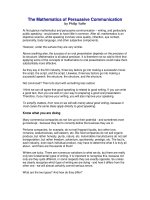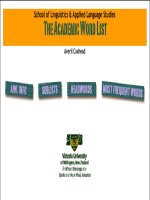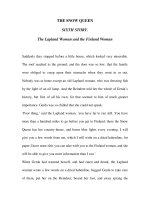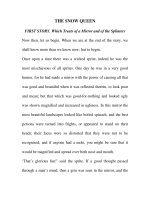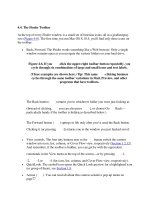Tài liệu THE SUBJUNCTIVE MOOD ppt
Bạn đang xem bản rút gọn của tài liệu. Xem và tải ngay bản đầy đủ của tài liệu tại đây (284.71 KB, 11 trang )
THE SUBJUNCTIVE MOOD
Introduction -- THE CATEGORY OF MOOD
The meaning of this category is the attitude of the speaker, or writer towards the content of the
sentence. It is expressed
in the form of the verb.
There are three moods in English-the indicative mood, the imperative mood and the subjunctive mood.
The indicative mood indicates that what is said must be regarded as a fact, as something which has
occurred or is occurring at the moment of speaking or will occur in the future. It may denote actions with
different time-reference and different aspective characteristics. Therefore the indicative mood has a wide
variety of tense and aspect forms in the active and passive voice.
The imperative mood expresses a command or a request to perform an action addressed to somebody,
but not the action itself. As it does not actually denote a specific action it has no tense category; the action
always refers to the future. Aspect distinctions and voice distinctions are not characteristic of the imperative
mood, although forms such as, be writing, be warned sometimes occur.
The imperative mood form coincides with the plain stem of the verb, for example: Come here! Sit
down. The negative form is built by means of the auxiliary do.
Do not take it away. Don't worry about the child. Don't be a fool.
Note: Do is also used in commands or requests to make them more emphatic: Do come and stay with
us. Do be quiet.
In commands and requests addressed to a third person or persons the analytical form let... + infinitive
is used. When the person addressed is denoted by a personal pronoun, it is used in the objective case. Let us
go together. Let him finish his dinner first. Let Andrew do it himself.
In negative sentences the analytical forms take the particle not without an auxiliary. Let us not argue
on the matter. Let him not overestimate his chances. Let her not go any further.
Note: In sentences like Don't let him go the negation refers to the verb let, which in this case fully
retains its original meaning of permission.
The analytical forms differ in meaning from the synthetic forms, because their meaning is closely
connected with the meaning of the pronoun included in the form. Thus let us do smth denotes an invitation
or a joint action, not an order or a request. Let him do it retains to some extent the meaning of permission.
Note: In the form let me (let me do it) the first person singular does not convey By imperative meaning
and should not therefore be regarded as the imperative. It conveys the meaning of I am eager to do it, allow
me to do it.
The imperative mood is used only in imperative sentences and can't be used in questions.
THE SUBJUNCTIVE MOOD
The Subjunctive Mood shows that the action or state expressed by the verb is presented as a non-fact,
as something imaginary or desired. The Subjunctive Mood is also used to express an emotional attitude of
the speaker to real facts. In Modem English the Subjunctive Mood has synthetic and analytical forms. "I
wish I were ten years older," I said. (Braine) “Хотел бы я быть на десять лет старше”, — сказал я. I wish
you would speak rationally. (E. Bronte) Я хотел бы, чтобы вы говорили разумно.
The synthetic forms of the Subjunctive Mood can be traced to the Old English period, when the
Subjunctive Mood was chiefly expressed by synthetic forms. In Old English the Subjunctive Mood had a
special set of inflections, different from those of the Indicative.
In course of time most of the inflections were lost and the difference between the forms of the
Subjunctive and those of the Indicative has almost disappeared. However, in Modern English mere are a few
synthetic forms of the Subjunctive which have survived; they are as follows: the Present Subjunctive of all
the verbs and the Past Subjunctive only of the verb to be.
I. The Present Subjunctive. In the Present Subjunctive the verb to be has the form be for all the
persons singular and plural, which differs from the corresponding forms of the Indicative Mood (the Present
Indefinite). In all other verbs the forms of the Present Subjunctive differ from the corresponding forms of the
Indicative Mood only in the third person singular, which in the Present Subjunctive has no ending -s.
The Present Subjunctive denotes an action referring to the present or future. This form is but seldom
used in Modem English. It may be found in poetry and in elevated prose, where these forms are archaisms
used with a certain stylistic aim. It is also used in scientific language and in the language of official
documents, where it is a living form.
1
THE USE OF THE SUBJUNCTIVE MOOD
I. SIMPLE SENTENCES
In simple sentences the synthetic forms of the Subjunctive Mood are more frequent than the analytical
forms. In simple sentences the Subjunctive Mood is used:
(1) to express wish (пожелание): Long live the Soviet Army! Да здравствует Советская Армия!
Success attend you! Да сопутствует вам успех!
То express wish the analytical subjunctive with the mood auxiliary may is also used. May success
attend you! Да сопутствует вам успех! May you live long and die happy! Желаю вам долго жить и быть
счастливым до конца своих дней.
(2) to express an unreal wish:
If only he were free! (Galsworthy) Если бы только он был свободен!
(3) in oaths and imprecations: Manners be hanged! . К черту всякие церемонии! ' Confound these
flies! Будь они прокляты, эти мухи!
(4) in some expressions: Be it so!
Пусть будет так! Да будет так! God forbidi
Боже упаси! Сохрани бог!
The Subjunctive Mood in simple sentences is characteristic of literary style, except in oaths and
imprecations, which belong to
BW
colloquial style.
II. COMPLEX SENTENCES
The Subjunctive Mood is used in conditional sentences to express an unreal condition (in the
subordinate clause) and an unreal consequence (in the principal clause).
In sentences of unreal condition referring to the present or future the Past Subjunctive of the verb to be
is used in the subordinate clause; with other verbs the same meaning is expressed by the Past Indefinite of
the Indicative Mood. In the principal clause we find the analytical subjunctive consisting of the mood
auxiliary should or would and the Indefinite Infinitive. Should is used with the first person singular and
plural, would is used with the second and third persons singular and plural. The world would be healthier if
every chemist's shop in England were demolished. (Shaw) Человечество было бы здоровее, если бы все
аптеки в Англии были уничтожены. I should kill myself to-day if I didn't believe that tyranny and
injustice must end. (Galsworthy) Я бы сегодня же покончила с собой, если бы не верила, что тирании и
несправедливости придет конец.
An unreal condition referring to the future can also be expressed by the Past Subjunctive of the verb to
he + to-Infinitive of the notional verb or the analytical Subjunctive with the mood auxiliary should for all the
persons. Such sentences are often translated by means of 'Если бы случилось так...', 'Случилось так...'
If I were to offer my home..., my station..., my affections,., to any one among the young women
engaged in my calling,
they would probably be accepted. Even readily accepted. (Dickens)
Если бы случилось так, что я предложил бы свой дом, свое положение в обществе, свою любовь
любой молодой
женщине моей профессии, все это, вероятно, было бы принято. Даже охотно принято.
Well, Major, if you should send me to a difficult spot — with this man alone, I'd feel secure. (Heym)
Знаете, wallop, если бы случилось так, что вы послали бы меня в. опасное место только с одним
этим человеком,
я бы чувствовал себя в безопасности.
If in the subordinate clause the mood auxiliary should is used, we often find the Indicative or
Imperative Mood in the principal clause.
If any of your family should come to my house, I shall be delighted to welcome them... (Trollope)
Если кому-нибудь из членов вашей семьи случится прийти в мой дом, я буду рад принять его. If he
should come, ask him to wait. В случае, если он придет, попросите его подождать.
In sentences of unreal condition referring to the past the Past Perfect of the Indicative Mood is used in
the subordinate clause;
in the principal clause we find the analytical subjunctive consisting of the mood auxiliary should (with
the first person) or would (with the second and third persons) and the Perfect Infinitive.
If I had consulted my own interests, I should never have come here. (Galsworthy)
Если бы я думал только о себе, я бы никогда сюда не пришел.
There are two mixed types of sentences of unreal condition. In the first of these the condition refers to
the past and the consequence refers to the present or future.
If you had taken your medicine yesterday, you would be well now.
Если бы вы вчера приняли лекарство, теперь вы были бы здоровы.
No, by my word and truth, I never despised you; if I had I should not love you now! (Hardy)
Нет, клянусь вам, я вас никогда не презирал; если бы я вас когда-нибудь презирал, я не любил
бы вас теперь.
In the second type the condition refers to no particular time and the consequence to the past.
If he were not so absent-minded, he would not have mistaken you for your sister.
Если бы он не был такой рассеянный, он не принял бы вас за вашу сестру.
Still Beatrice bad taken the trouble to go up to London and to buy the books for me. She would not
have done that if she
disliked me. (Du Mawler)
Все-таки Беатриса взяла на себя труд съездить в Лондон и купить мне эти книги. Она бы этого
не сделала, если
бы не любила меня.
Note.— Unreal conditions may also be expressed in the following ways:
(a)But for the rain, we should go down to the country.
Если бы не дождь, мы бы поехали за город.
His fleshtess? face would have looked like the face of a mummy, but for the restless brightness of his
little black eyes.
(Cottins)
Его изможденное лицо было бы похоже на лицо мумией, если бы не беспокойный блеск
маленьких черных глаз.
(b) If it were not for your help, I should not be able to finish my work in time.
Если бы не ваша помощь, я не смог бы вовремя закончить работу.
If it hadn't been for me, Ms own brother would have shut him up for life. (Dickens)
Если бы не я, его собственный брат засадил бы его (в сумасшедший дом) на всю жизнь.
In sentences of unreal condition the modal verbs might and could are often used; they fully retain their
modal meaning and therefore they do not form the analytical subjunctive.
Here we have the group 'modal verb + Infinitive' which forms a compound verbal modal predicate,
whereas the analytical subjunctive forms a simple predicate.
If she were still waiting, she might be restless, feverish, but surely she would not look like this.
(Galsworthy) Если бы она все еще ждала, она, возможно, нервничала бы, но, безусловно, она не
выглядела бы так. 1 could haw done very well if 1 had been without the Murdstones. (Dickens) Я мог бы
очень хорошо учиться, если бы не Мердстоны.
Would, when used in the subordinate clause of a sentence of unreal condition, is also a modal verb
forming with the infinitive a compound verbal modal predicate.
If you would come and see us..., mother would be as proud of your company as I should be. (Dickens)
Если бы вы пожелали навестить нас..., моя матушка была бы так же польщена этим, как и я.
Note,— In conditional sentences of real condition naturally the Indicative and not the Subjunctive
Mood is used. Such sentences
can refer to the present future or past. But I can bear anything gladly if you are happy. (Eliot) If you
make this disgusting match, you will never see Hector again. (Shaw) The whole thing was on his conscience
— for if Jon had anything, he had a conscience. (Galsworthy)
The conjunctions introducing adverbial clauses of condition are:
if, in case, provided, suppose, unless, and some others. If is the most common conjunction used in
sentences of real and unreal
condition.
In case and provided are chiefly used in sentences of real condition.
In case I don't find her at home, I shall leave her a note.
В случае, если я не застану ее дома, я оставлю ей записку.
I shall go there provided you consent to accompany me. (Ch. Bronte)
Я пойду туда при условии, что вы согласитесь пойти со мной.
Suppose is more common in sentences of unreal condition.
Suppose he wrote to you, would you answer?
Предположим, он написал бы вы, вы бы ответили?
Unless is used in sentences of real and unreal condition.
I shall come in time unless I am detained at the Institute. Я приду вовремя, если меня не задержат
в институте.
Isabel would not have engaged herself to Mr, Hardyman unless she had been fond of him. (Collins)
Изабелла не согласилась бы выйти за мистера Хардимена, если бы не любила его.
Note.— Unless has a negative meaning; it corresponds to the Russian если не. There are cases,
however, when the Russian если
не cannot be rendered in English by unless; only if not is possible. Осторожно переходите улицу,
если не хотите попасть под машину.
Cross the street carefully if you don't want to be run over. In this sentence unless would sound
ironically (... разве что тебе захочется попасть под машину).
Adverbial clauses of condition containing the verbs had, were, could and should are often introduced
without any conjunction. In these cases we find inversion.
Had the wanderer remained awake for another half-hour, a strange sight would have met his eyes.
(Conan Doyle)
Если бы путешественник продолжал бодрствовать еще в течение получаса, его глазам
представилось бы
странное зрелище.
I should be myself were I once again among the heather in those hills. (E. Bronte)
Я стала бы такой, как прежде, если бы вновь очутилась на этих холмах, поросших вереском.
Should he come this way, I will speak to him. (Ch. Bronte)
Если ему случится быть здесь, я поговорю с ним.
The Subjunctive Mood is used in sentences expressing what may be understood as an unreal
consequence, the condition of which is not expressed as such.
I suppose you are a stranger in these parts, or you would have heard what happened last autumn. (Ch.
Bronte) Наверно, вы приезжая, иначе вы бы знали о том, что случилось здесь осенью. There was no
piano... because it would have taken up much room. (Galsworthy)-Рояля не было..., так как он занял бы
много места.
The Subjunctive Mood is used in adverbial clauses of purpose. When a clause of purpose is
introduced by the conjunctions that, so that, in order that, we find the analytical subjunctive with the mood
auxiliary may (might) if the principal clause refers to the present or future; if the principal clause refers to the
past, only the form might is used.
As has already been stated, the mood auxiliary may(might) retains in this case a shade of modality.
She opens (will open) the window that she may (might) get a breath of fresh air.
She opened the window that she might get a breath of fresh air. Order a conveyance to be at the door
to-morrow evening,
rather earlier man is absolutely necessary, in order mat we may be in good time. (Dickens)
Прикажите подать экипаж завтра вечером пораньше, чтобы мы приехали заблаговременно
(чтобы мы могли
приехать заблаговременно).
Mr. Micawber impressed the names of streets, upon me that 1 might find my way back easily.
(Dickens)
Мистер Микобер заставил меня запомнить названия улиц, чтобы я легко нашел дорогу обратно
(чтобы я мог
легко найти до-рогу обратно).
Не got up, cautiously, so that he might not wake the sleeping boy. (Cronin)
Он тихо поднялся, чтобы не разбудить спящего мальчика.
Occasionally the mood auxiliary should is used.
I made shorthand notes of all that she said, however, so that there should be no possibility of a
mistake, (Conan Doyle)
Я сделал стенографическую запись всего, что она говорила, чтобы исключить возможность
ошибки,
If a clause of purpose is introduced by lest the mood auxiliary should (for all persons) is generally
used. Lest has a negative meaning (чтобы не).
She opens (opened, will open) the window lest it should be stuffy in the room.
She... looked steadily at her coffee lest she also should begin to cry, as Anna was doing already.
(Eliot)
Она не поднимала глаз от чашки кофе,.чтобы не заплакать, как уже плакала Анна.
The Subjunctive Mood is used in adverbial clauses of concession. Adverbial clauses of concession
are introduced by the conjunctions and connectives though, although, however, no matter, whatever,
whoever, etc. The analytical subjunctive with the mood auxiliary may (might) is generally used.
Though he may (might) be tired Tired though he may (might) be
No matter how tired he may (might) be he will go to the concert. However tired he may (might)
be
Как бы он ни был утомлен, он пойдет на концерт.
Whatever obstacles may arise, we shall not give in.
Remember, the truth, however ashamed of it you may be, is better than any He. (Dreiser) Помните,
что правда, как бы вы ни стыдились ее, лучше, чем любая ложь. I must return to the city, no matter what
dangers may lurk there. (Dreiser) Я должен вернуться в город, какие бы опасности ни поджидали меня
там.
4
... I should like to do some good to you and your husband, whoever he may be. (Hardy) Я хотел бы
быть полезным вам и вашему мужу, кто бы он ни был.
If the action of the subordinate clause is prior to that of the principal clause the Perfect Infinitive is
generally used. However badly he may have behaved to you in the past he is still your brother. (Wilde) Как
бы плохо он ни вел себя по отношению к вам в прошлом, он все же ваш брат. Note.—The Indicative
Mood is used in adverbial clauses of concession when the action or state is considered as an actual fact
and not as something supposed. Compare:
Cold though it may be, we shall go to the skating-rink {Subjunctive Mood).
Как бы ни было холодно, мы пойдём на каток.
Cold as it is, we shall go to the skating-rink (Indicative Mood).
Как ни холодно, мы пойдем на каток.
The Subjunctive Mood is used in adverbial clauses of time and place after the conjunctions
whenever and wherever; in these cases the clauses have an additional concessive meaning. Whenever you
may (might) come, you are welcome. Когда бы вы ни пришли, мы вам всегда рады. Wherever she may
(might) live, she will always find friends. Где бы она ни жила, она всегда найдет друзей.
Of course, I shall come for your marriage, whenever that may be fixed. (Trollope) Конечно, я приеду
на вашу свадьбу, когда бы ее ни назначили.
The Subjunctive Mood is used in adverbial clauses of comparison (or manner) introduced by the
conjunctions as if and as though (the latter is more literary).
If the action of the subordinate clause is simultaneous with that of the principal clause the Past
Subjunctive of the verb to be is used; with other verbs the same meaning is expressed by the Past Indefinite
of the Indicative Mood.
She speaks (spoke) about him as if she knew him well.
Она говорит (говорила) о нем так, как будто она его хорошо знает (знала).
She greeted him as if he were her brother. (Galsworthy)
Она поздоровалась с ним так, как будто он был ее братом.
Не speaks as if he knew you! (Collins)
Он говорит так, как будто он вас знает! Rex got from his seat, as if he held the conference to be at
an end. (Eliot)

